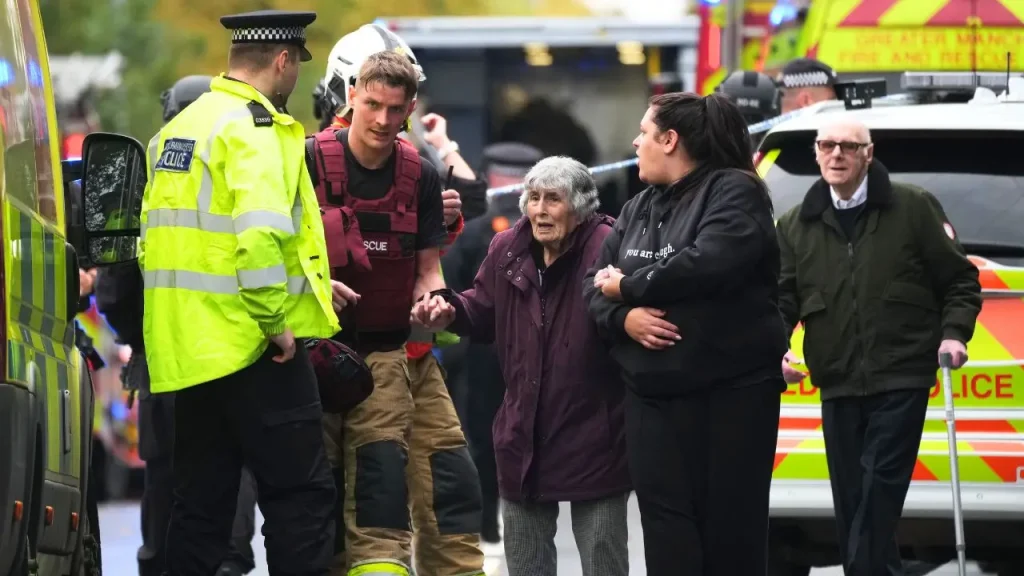Manchester Terror Attack: Community in Shock as Details Emerge
In a tragic turn of events that has shaken the UK, a terror attack outside a synagogue in Manchester on Thursday has left the local community and the nation in mourning. The suspect, identified as Jihad Al-Shamie, a 35-year-old British citizen of Syrian descent, targeted worshippers at the Heaton Park Hebrew Congregation Synagogue during Yom Kippur, the holiest day in the Jewish calendar. Al-Shamie, whose surname translates to “the Syrian” in English, had entered the UK as a young child and became a naturalized citizen in 2006, with no prior criminal record. The attack, which has been officially classified as terrorism by the Metropolitan Police in London, has sparked renewed concerns about rising antisemitism across the United Kingdom and prompted immediate responses from the highest levels of government.
The horror unfolded around 9:30 a.m. local time when Al-Shamie allegedly rammed a car into pedestrians outside the Orthodox synagogue before launching a knife attack on those nearby. In a particularly chilling detail, he wore what appeared to be an explosives belt, later determined to be fake. Armed police quickly responded to the major incident, ultimately shooting and killing the suspect minutes after the attack began. The human toll was devastating – two lives were lost, identified as Adrian Daulby, 53, and Melvin Cravitz, 66, both from the Crumpsall area. Four others sustained injuries, with police later clarifying that one of the deceased victims and one hospitalized victim suffered gunshot wounds likely from police gunfire during the chaotic response. In the aftermath, authorities moved swiftly to arrest three additional suspects – two men in their 30s and a woman in her 60s – on suspicion of involvement in preparing or committing acts of terrorism.
The attack has left those who knew Al-Shamie struggling to reconcile the seemingly ordinary neighbor with the perpetrator of such violence. Residents of Prestwich, the Manchester suburb where Al-Shamie’s family had lived for years, just a couple of miles from the targeted synagogue, recalled seeing him lifting weights and exercising in his backyard – ordinary activities that gave no indication of his violent intentions. One neighbor, Geoff Halliwell, expressed his shock to The Associated Press, describing Al-Shamie as what had appeared to be “a straightforward, ordinary lad.” This disconnect between the peaceful community member and the violent attacker has added another layer of distress for the local community, highlighting the often invisible nature of radicalization and the challenges faced by security services in identifying potential threats before they materialize.
Social media captured the terrifying moments of the attack and police response, with videos showing armed officers surrounding a person lying on the ground beneath the blue Star of David emblazoned on the synagogue building. The footage revealed the tension of the moment, with bystanders heard claiming the suspect had a bomb and was attempting to detonate it. When the man attempted to rise, officers fired, bringing him down. These harrowing images have circulated widely, bringing the reality of terrorism directly to screens across the country and world, and serving as a stark reminder of the persistent threat of ideologically motivated violence. The attack joins a troubling global pattern of violence targeting religious institutions and communities, particularly Jewish ones, which have experienced heightened vulnerability since the outbreak of conflict in the Middle East last year.
Prime Minister Keir Starmer addressed the nation following the attack, leaving no ambiguity about its nature, describing it as a “vile terrorist attack that attacked Jews, because they are Jews.” His words acknowledged the specific targeting of the Jewish community and placed the incident within the broader context of rising antisemitism. Starmer’s pledge that “Britain must defeat it, once again” and his promise to “do everything in my power to guarantee you the security you deserve” to Jewish citizens reflected the government’s recognition of both the immediate security concerns and the deeper societal challenge of combating hatred. The Prime Minister’s response underscored the political commitment to protecting vulnerable communities while acknowledging the historical echoes of antisemitism that make such attacks particularly resonant and traumatic for the Jewish community.
The attack occurs against a backdrop of dramatically increased antisemitic incidents in the UK following Hamas’ October 7, 2023, attack on Israel and the subsequent Israeli military campaign in Gaza. According to the Community Security Trust, an advocacy group for British Jews focused on eliminating antisemitism, more than 1,500 antisemitic incidents were reported in the first half of this year alone – the second-highest figure on record. This surge in hostility has created an atmosphere of fear and vulnerability for many Jewish communities across the UK, with increased security measures at synagogues and community centers becoming necessary realities. As Manchester begins the difficult process of healing from this attack, questions remain about radicalization pathways, the effectiveness of counter-terrorism measures, and how communities can protect themselves while remaining open and welcoming. The tragedy serves as a somber reminder of the real-world consequences of extremism and hatred, and the ongoing vigilance required to preserve the values of tolerance and religious freedom in diverse societies facing complex global tensions.


